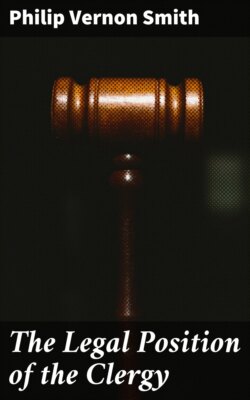Читать книгу The Legal Position of the Clergy - Philip Vernon Smith - Страница 22
На сайте Литреса книга снята с продажи.
Оглавление16. Canon 75 not only forbids ecclesiastical persons to resort, except for their honest necessities, to taverns or alehouses, or to board or lodge therein, or to spend their time in drinking or riot or playing at dice, cards, or tables, or any other unlawful games, but also prohibits them from engaging in any base or servile labour. And a clergyman who holds any cathedral preferment, benefice, curacy, or lectureship, or is licensed or is otherwise allowed to perform the duties of any ecclesiastical office, is subject to certain specific legal restrictions as to engaging in business or trade. (a) He may not acquire for occupation, use, or cultivation more than eighty acres of land without the written permission of the bishop, which must be restricted to a specified number of years not exceeding seven. (b) He may not engage in any trade or dealing for profit except where it is carried on by more than six partners, or by a company, or where the concern, or a share in it, has devolved on him under a will or settlement, or by inheritance or marriage or bankruptcy; and in none of the excepted cases may he act as a director or managing partner, or carry on the concern in person. These restrictions, however, do not extend to keeping a school or seminary, or being employed as a schoolmaster or tutor, or being concerned in education for profit, or buying or selling or otherwise acting in relation to such school, seminary, or employment. Nor of course do they prevent an incumbent from farming, if he pleases, his own glebe lands. Nor do they interfere with the sale, even at an enhanced price, of goods which a clergyman actually buys for the use of his household, but afterwards does not want to keep, nor with the sale of books to or through a bookseller or publisher. He may also be a manager, director, partner, or shareholder in any benefit society, or fire or life assurance society, and may sell minerals from mines on his own lands, and also (provided he do not do so in person at a market or other public sale) may buy and resell for profit cattle, corn, and other things required for the occupation, cultivation, and improvement of glebe or other lands lawfully held by him. The penalties for unlawfully trading are, for the first offence, suspension for not exceeding one year, for the second offence suspension for a longer period, and for the third offence deprivation ab officio et beneficio.[27]
